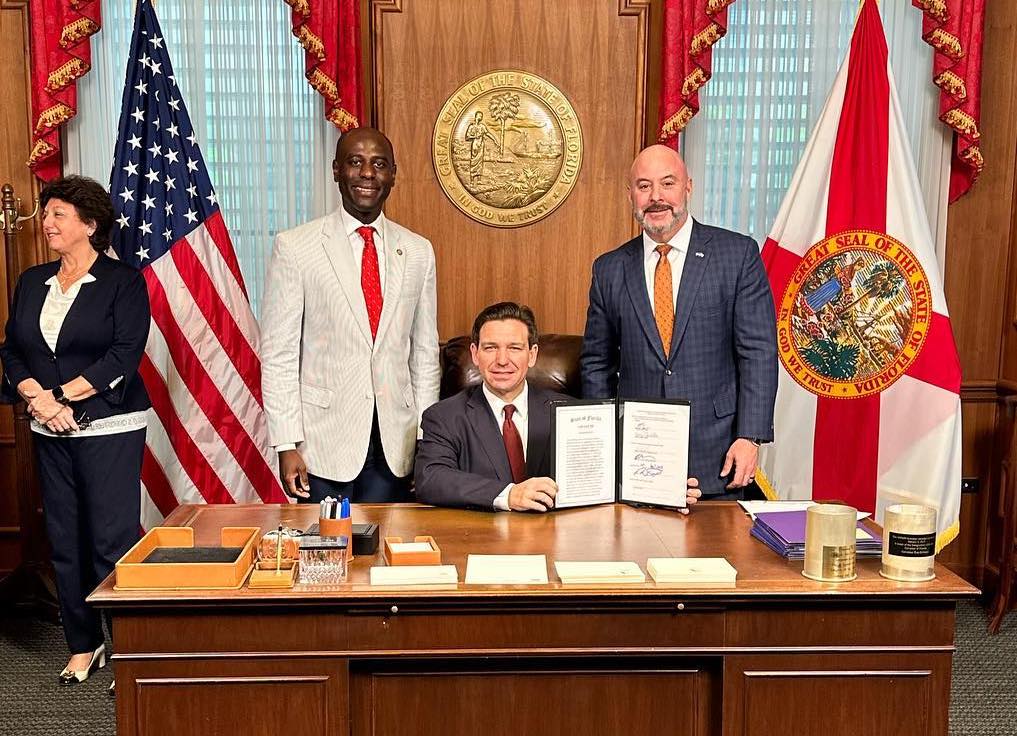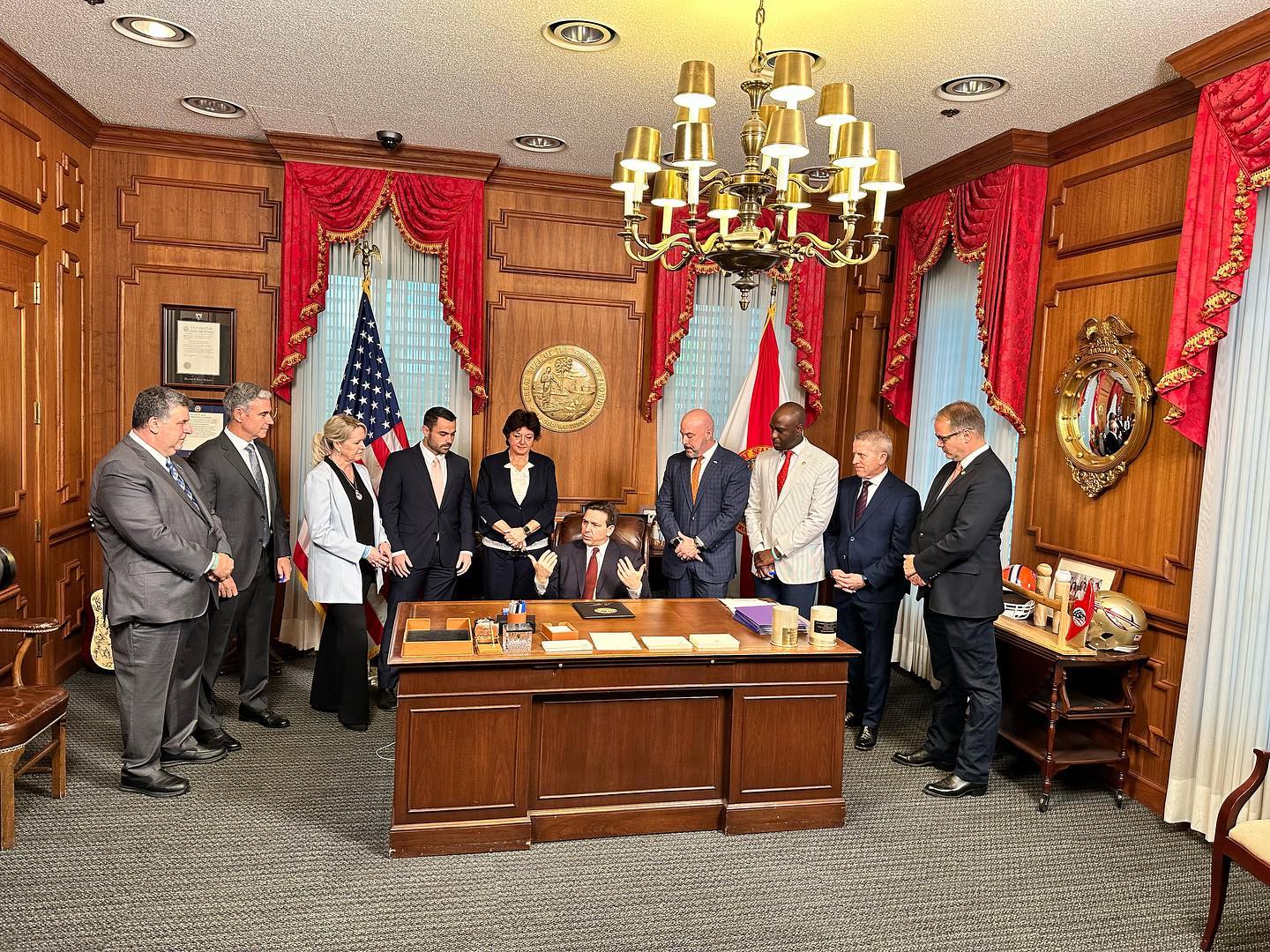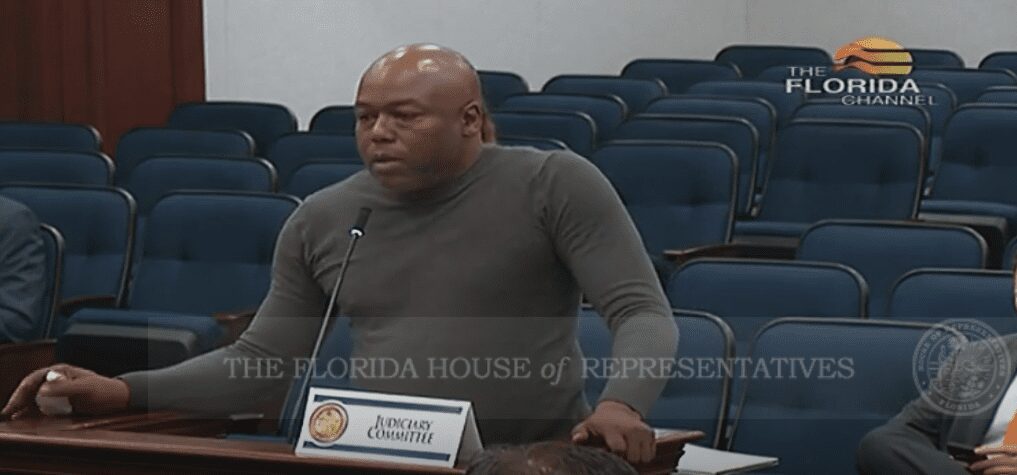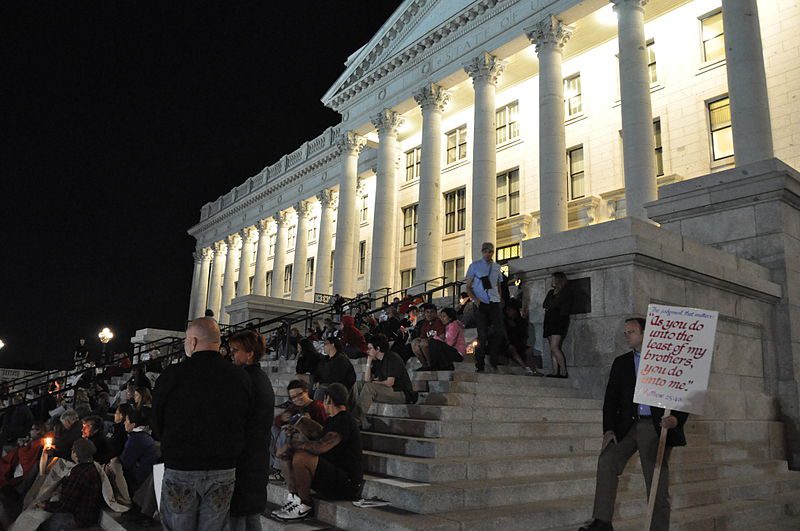Exonerees Sound the Alarm on New Florida Law Allowing Death Sentences by Split Juries
The majority of Floridians exonerated from death row had been sentenced by non-unanimous juries, raising concern that the law that brings them back will lead to more wrongful convictions.
| April 26, 2023

Herman Lindsey braced himself for news that he would be sentenced to death as he sat inside a courtroom in Broward County, Florida in 2006. A jury had convicted Lindsey of capital murder for the 1994 killing of a Fort Lauderdale pawn shop employee, despite Lindsey maintaining his innocence and the lack of evidence linking him to the crime. Now, jurors were contemplating whether to spare his life or send him to death row.
“I was kind of numb,” Lindsey told Bolts. “I still couldn’t believe that I was convicted and facing death.”
At the time, a death sentence only required a recommendation from a majority of jurors. When the foreman read out the jury’s vote on Lindsey’s fate, it was 8–4. The judge then sentenced him to death.
Three years later, in 2009, the Florida Supreme Court unanimously concluded that the evidence was “insufficient to support Lindsey’s conviction” and was “equally consistent with a reasonable hypothesis of innocence,” vacating his conviction. He was exonerated and freed from death row.
Though Linsdey now travels the country speaking about his experiences with the death penalty, he still feels the lingering effects of death row and prefers to spend his time at home alone in his room, away from friends and family. “It was traumatizing,” said Lindsey, who is now the executive director of Witness to Innocence, an organization that advocates for ending the death penalty and is led by death row exonerees.
After Lindsey’s exoneration, Florida revamped its sentencing scheme to require that jurors unanimously vote for capital punishment in order for judges to impose death sentences. But after a jury voted 9–3 to spare Parkland shooter Nikolas Cruz’s life in 2022, some legislators responded by introducing a bill that removed mandatory unanimity. Instead, only an 8–4 majority would be required for death.
Last week, Florida Governor Ron DeSantis signed the bill into law, creating the lowest standard among the 24 states that allow the death penalty. “Once a defendant in a capital case is found guilty by a unanimous jury, one juror should not be able to veto a capital sentence,” DeSantis said in a statement. “I’m proud to sign legislation that will prevent families from having to endure what the Parkland families have and ensure proper justice will be served in the state of Florida.”
Opponents, however, say that the legislation will contribute to more wrongful death sentences in the state. Florida’s death sentences are the most unreliable in the country: It is the state with the highest number of death row exonerations, with 30 people since 1973, the majority of whom were sentenced to death by non-unanimous juries.
“It makes Florida the extreme death penalty state in this country,” said Maria DeLiberato, a capital litigation attorney and executive director of Floridians for Alternatives to the Death Penalty. “We know that non-unanimity leads with less deliberation, less thoughtfulness, is rooted in racism and is designed to silence Black and Brown voices on a jury.”
In 2016, the U.S. Supreme Court ruled that Florida’s capital sentencing scheme violated the Constitution. In that case, Hurst v. Florida, the court ruled 8–1 that the way the state decided whether to sentence someone to death violated the Sixth Amendment, the constitutional right to a jury trial, because the judge, not the jury, was responsible for considering the facts necessary for the imposition of a death sentence.
Following Hurst, the Florida Supreme Court found that the jury must unanimously agree to impose a death sentence. Lawmakers moved to amend the statute, enacting a jury unanimity requirement in 2017. The change brought Florida in line with the sentencing standards of all other death penalty states, where juries must unanimously agree on a death sentence, with the exception of Alabama, which calls for a 10–2 majority.
As part of the overhaul, approximately 200 of 400 Florida prisoners who were sentenced to death under the old scheme became eligible for resentencing. One study found that the jury had failed to unanimously agree on a death sentence in roughly two-thirds of those cases. As of 2020, 34 prisoners were resentenced to life in prison, four were resentenced to death, and two were exonerated.
Then in 2020, the Florida Supreme Court reversed course. Three of the seven justices reached retirement age and DeSantis filled those seats with conservative judges from the Federalist Society who pushed the court further to the right. As a result, it concluded in the case State v. Poole that juries didn’t have to unanimously agree on a death sentence after all, and the previous court “got it wrong.” While the decision didn’t change Florida’s capital sentencing law, it signaled to the legislature that if they were to pass a law dismantling jury unanimity, the court wouldn’t get in its way.

After the jury in Cruz’s case reached a verdict of life without parole, DeSantis urged tougher sentencing.
“We need to do some reforms to be better serving victims of crimes and the families of victims of crimes and not always bend over backwards to do everything we need to for the perpetrators of crimes,” he said at the time, according to the Associated Press.
The case led state Representative Berny Jacques, a Republican from Pinellas County, to sponsor a bill permitting the death penalty without all jurors agreeing. Under the recently signed law, the jury must unanimously find at least one aggravating factor from a list of 16—such as the crime being “especially heinous, atrocious, or cruel”—in order to consider the death penalty.
If fewer than eight of the 12 jury members vote for the death penalty, the person will be sentenced to life in prison without the possibility of parole, according to the bill. If at least eight jurors choose death, the judge still has the authority to override their recommendation and hand down a life sentence—and then must explain their decision in writing.
In pushing the legislation, Jacques, who did not return requests for comment for this story, also pointed to the case of a man convicted of killing a police officer in his county who was spared the death penalty after two jurors voted for a life sentence. “This law will correct a wrong in our statutes, a statute that was based on a flawed Supreme Court ruling that was overturned three years ago,” Jacques told a Florida TV station. He cheered the governor’s signing of the legislation last week in an update to constituents that he posted on social media, saying, “No more in the state of Florida will a small handful of jurors be able to stop the most heinous of criminals from receiving the death penalty.”
Robert Dunham, former executive director of the Death Penalty Information Center and an adjunct professor of death penalty law at the Temple University Beasley School of Law, cautioned that Florida’s new law will impact people wrongfully facing death more than mass shooters.
“The effect…will be that people like Herman Lindsey are going to be sentenced to death,” he told Bolts. “The effect is going to be most pronounced not in the tiny number of mass shooting cases that actually ever make it to trial. The effect will be in the large number of marginal death penalty cases.”
The imposition of non-unanimous jury decisions can be traced back to the Jim Crow era, when laws were created to ensure that white jurors, who reliably made up the majority of jurors in courtrooms across the South throughout the first half of the 20th century, won their desired verdict. In Florida, researchers have found that juries today are still disproportionately made up of white people. A 2021 study conducted by the ACLU of capital cases in Duval County, which is home to Jacksonville, found that Black people were excluded from serving on the jury at rates more than twice of white jurors. A 2010 report by the Equal Justice Initiative found the courts have invalidated more than 33 criminal convictions throughout the state because prosecutors unlawfully struck jurors because of their race.
“That means that, the jury that is ultimately empaneled in Florida will on average have fewer jurors of color than one-third of the jury,” said Dunham. “And that means that in a jury non-unanimity system, in which you need more than one-third of the jury to ensure a life sentence, that you’ve just disenfranchised the minority community. The other jurors don’t have to listen to them because they don’t have to reach a unanimous verdict.”
In capital cases, the racial makeup of the jury can significantly impact case outcomes. One study published in 2004 found that white jurors were four times more likely to recommend the death penalty during sentencing compared to Black jurors. Jury unanimity has also been shown to impact the integrity of convictions: a 2020 Death Penalty Information Center study found that in the three states that had allowed death sentences by non-unanimous juries—Florida, Alabama, and Delaware (which abandoned the death penalty in 2016)—at least one juror had voted for life without parole in 93 percent of exonerations.
In Ralph “Ron” Wright’s case, for example, five jurors voted to spare his life. An Air Force veteran and former police officer, he was exonerated in 2017 after spending three years on Florida’s death row. Like Lindsey, there was no evidence linking him to the crime. Wright remembered looking through his window to watch hearses rolling away with prisoners’ bodies on execution days. “You’re thinking ‘Is that day going to come for me?’”
Wright denounced the new law, telling Bolts, “It just makes it easier for someone to be sentenced to death.”
Clemente Aguirre-Jarquin spent a decade on Florida’s death row even though not all of his jurors voted for life without parole. He was exonerated in 2018 after DNA evidence cleared him and someone else confessed to the crime.
“It is taking the power from the people. Your vote should be respected. I guarantee you that there will be many, many more wrongful convictions,” he told Bolts.
Ed Brodsky, a state attorney and president of the Florida Prosecuting Attorneys Association, defended the law, telling Bolts that under the previous unanimity requirement, weighing whether to seek the death penalty was a “much more onerous process.”
“So from 2017 to today, we were following this unanimous jury verdict procedure, which I think made it much more difficult, and I think certainly heightened our requirements, and our feelings that certain defendants would be out—you know, would we be able to satisfy that very high burden?” he said.

Under the new law, jurors would still be required to unanimously convict, and the emergence of new technology and forensics such as DNA testing should safeguard against wrongful convictions, Brodsky said. “We’re talking about such a wealth of information that is now available to be presented to a jury so that when we go forward with one of these cases, and a jury makes a determination of life or death, I really feel that they are being given such an overwhelming amount of scientific evidence, forensic evidence, witness testimony.”
After DeSantis signed the bill last week, the law became effective immediately. DeLiberato of Floridians for Alternatives to the Death Penalty said that the sudden enactment leaves many questions about how it will be applied to past, current, and future cases, or how it will affect the approximately 60 prisoners awaiting resentencing under the Hurst decision. Decisions about the application of the law will play out in courts across Florida. For her part, DeLiberato said she will argue that jury unanimity is required and the latest amendment is unconstitutional.
“While the Parkland tragedy was unimaginable and horrific, we cannot and should not make important legislative decisions based on one case,” she said.
For Lindsey, 17 years have passed since he was sentenced to death. He said that instead of enacting laws that eviscerate protections for capital defendants, legislators should focus on passing reforms to ensure more people aren’t wrongfully sent to death row.
“Passing this bill, yes it will create more innocent people going to death row,” he told lawmakers when testifying against it at a legislative hearing in March. “My vote count was 8-4, and we don’t even understand how the jury reached the verdict of guilty, but the jury got it wrong.”
“When the jury got it wrong in my case, and the Florida Supreme Court ruled unanimously that I shouldn’t have been convicted, there was no bill on this desk to compensate me or get me my rights back,” Lindsey added. “The jury got it wrong then, and I don’t think it’s fair that we change the law now. I think what we need to do is find a way to fix our system, not to continue to break it.”




